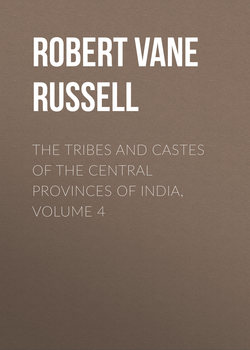Читать книгу The Tribes and Castes of the Central Provinces of India, Volume 4 - Robert Vane Russell - Страница 46
Part II
Articles on Castes and Tribes
Kumhār—Yemkala
Vol. IV
Kurmi
7. The marriage-cakes
ОглавлениеAnother preliminary ceremony is the family sacrament of the Meher or marriage-cakes. Small balls of wheat-flour are kneaded and fried in an earthen pan with sesamum oil by the eldest woman of the family. No metal vessel may be used to hold the water, flour or oil required for these cakes, probably because earthen vessels were employed before metal ones and are therefore considered more sacred. In measuring the ingredients a quarter of a measure is always taken in excess, such as a seer59 and a quarter for a seer of wheat, to foreshadow the perpetual increase of the family. When made the cakes are offered to the Kul Deo or household god. The god is worshipped and the bride and bridegroom then first partake of the cakes and after them all members of the family and relatives. Married daughters and daughters-in-law may eat of the cakes, but not widows, who are probably too impure to join in a sacred sacrament Every person admitted to partake of the marriage-cakes is held to belong to the family, so that all other members of it have to observe impurity for ten days after a birth or death has occurred in his house and shave their heads for a death. When the family is so large that this becomes irksome it is cut down by not inviting persons beyond seven degrees of relationship to the Meher sacrament This exclusion has sometimes led to bitter quarrels and actions for defamation. It seems likely that the Meher may be a kind of substitute for the sacrificial meal, at which all the members of the clan ate the body of the totem or divine animal, and some similar significance perhaps once attached to the wedding-cake in England, pieces of which are sent to relatives unable to be present at the wedding.
59
2 lbs.
